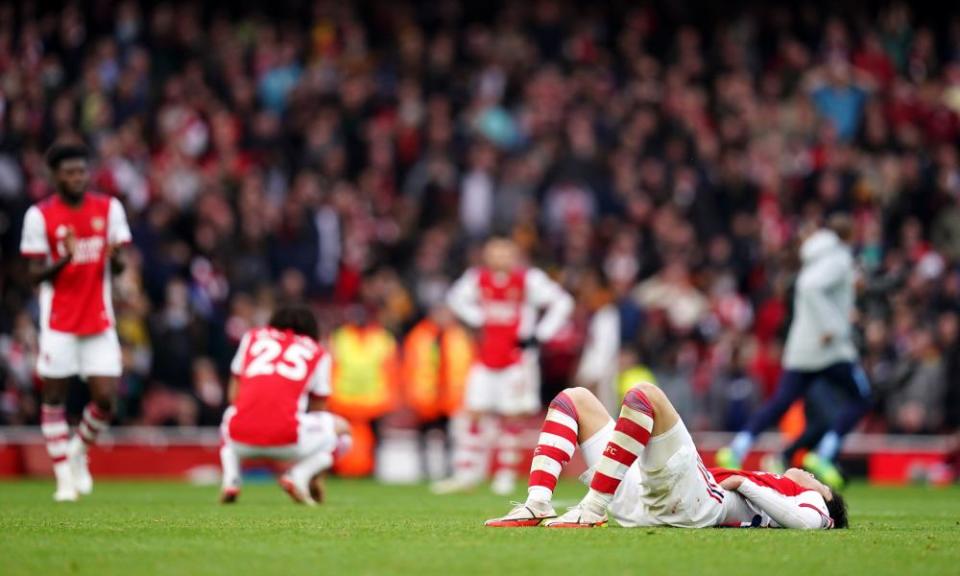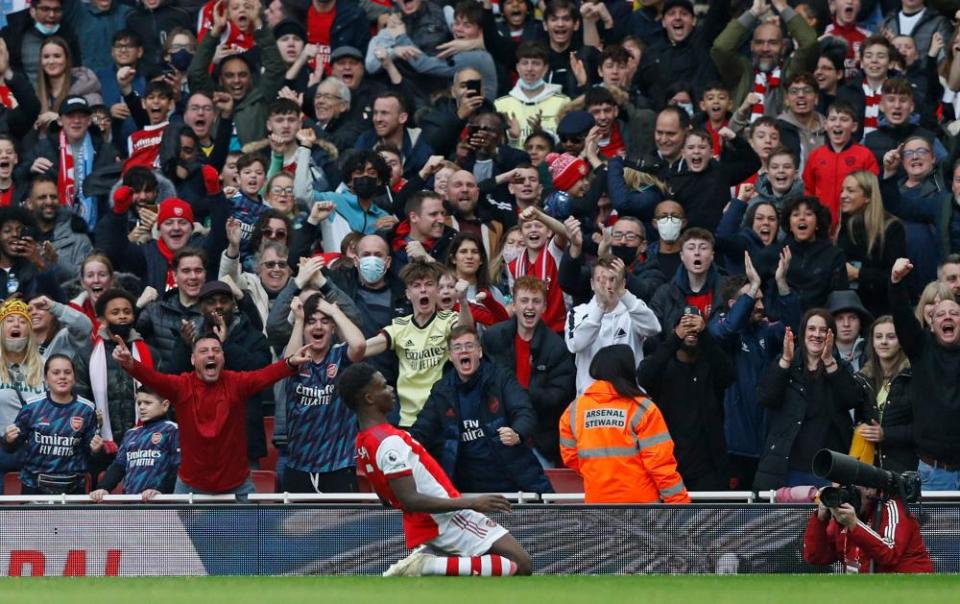Arsenal floored but Bukayo Saka and co left wearing a little halo of hope

A strange and unfamiliar noise swirled around the Emirates Stadium at full-time. Strewn across the turf in red and white was the human rubble of a crushing injury-time defeat. Takehiro Tomiyasu and Ben White were out cold. Thomas Partey, hand outstretched, helped them up. And as Arsenal’s exhausted players slowly winched themselves to their feet, the four sides of the ground rose to applaud them: a gesture of approval, pride, perhaps even defiance.
Yes, Arsenal had lost to Manchester City again. Yes, it had been largely self-inflicted again. But somehow this did not feel like the other times.
Related: Rodri’s injury-time strike gives City win as 10-man Arsenal blame VAR
To anyone who lived through the really bad years, who has seen this stadium at its most toxic and disenchanted, who has seen successive generations blanched and brutalised, this in itself was bracingly new. We can argue about how good this Arsenal side actually are, about whether their recent boost in form is any more sustainable than the ones that preceded it. But right now there is a little halo of hope around this club, and it feels like the most fragile and the most important thing at once.
Let’s deal with the game first: Arsenal were brilliant for 45 minutes at the start and resolute for 30 minutes at the end with 10 men. Even so, we cannot ignore the fact that, at the pivotal points of the game, City held their nerve and Arsenal lost theirs. This, as much as anything they do tactically or technically, is the true mark of City’s current dominance over English football: no team since Alex Ferguson’s Manchester United has been as adept at leveraging their aura and reputation.
Referees get flustered. Opponents do stupid things. The margins for error are so fine that every moment becomes a pressure-point, a high-stress situation, a potential disaster in the making. Does Gabriel clean out Gabriel Jesus and earn a second yellow if he isn’t painfully aware of City’s speed on the counter? Does Granit Xhaka tug desperately at Bernardo Silva’s shirt if he isn’t wary of Silva’s ability to squirm through the tiniest gap at light speed? This is the privilege of champions: even when you’re not at your best, oppositions still have to pretend you are.
And yet, for a decent chunk of the game, Arsenal offered the rest of the league a blueprint. They put on a show. The full-backs camped out in the City half. Partey and Martin Ødegaard had the keys to the midfield. Most importantly they had a goal to show for their efforts and it came from the player who more than anyone seems to embody the spirit and basic tactile pleasure of this Arsenal side. There is perhaps no better noise in English football right now than the sound a crowd makes when Bukayo Saka gets the ball in space.
Something strange is happening with Saka at the moment. It’s not simply that he’s a brilliant player in a rich vein of form, although he is and he is. It’s more the way people respond to him: Arsenal fans, England fans, rival fans, children, grandparents. People love this guy.

People who don’t even like football like Saka. Hard-bitten fans in the Clock End who have spent decades screaming abuse at anyone bold enough to step within earshot melt like marshmallows in his presence. Consider: this is a guy who misses the crucial penalty in a European Championship final, England’s first major men’s final for 55 years, and somehow he doesn’t get turned into a pizza advert or a punchline or a meme. Instead, people love him more. People clutch him to their hearts a little tighter. People feel for him.
One could see it in the way he disappeared into the crowd after scoring his goal: a sea of bobbing heads and screaming faces and phone screens. Grown men and women ruffled his hair and shouted things into his ear and threw their arms towards him, hoping to touch the hem of his garment.
On one level, it was merely the futile first goal in a 2-1 defeat. But as a moment of pure human connection it was the most powerful moment of the day, and by extension the year.
Saka has already survived. He knows what tough times feel like. Last year he was Arsenal’s player of the season in a thoroughly joyless, depressing campaign. Doubtless there will be tougher times to come too, particularly in this flawed and improving young team still trying to find its place in the world.
But somehow in the bear pit of modern football, a place that feels angrier and more balkanised with every passing week, this 20-year-old man still manages to turn out every week and show us a little joy. And that, at least, is something worth holding on to.

 Yahoo Sports
Yahoo Sports 
